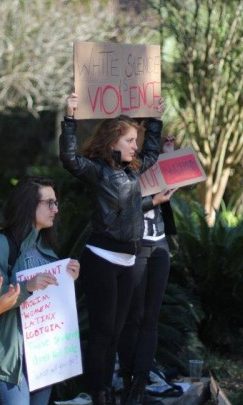An open letter to white radicals

Ella Helmuth | Staff Photographer
As radicals, we speak a lot about equality. It is, and it should be, the foundation of our thought. But as white radicals, talking incessantly about the need for material justice is a meaningless expression of privilege so long as it is divorced from productive and revolutionary action.
According to Karl Marx, “To be radical is to grasp things by the root.”
Whether we consider ourselves socialists or communists or anarchists or any combination therein, we are certainly radicals. Our outlook is not defined by the details of our theoretical program, but by the dedication we share to ceaseless questioning.
The issue is that this reliance on theory has a tendency to lock us in our heads. As white people, and therefore as functioning oppressors in a racist society, it is easy to see systems of subjugation as distant from ourselves, operating outside of reality. We turn to radical doctrine in order to feel connected, in an often rather perverted manner, with genuine struggles of genuine people, without understanding their battles or forcing ourselves from the comfort of our headspace.
To us, racism easily becomes a byproduct of capitalism explained away by the need to divide the working class. The disenfranchisement of the poor is merely a symptom of exploitation that will evaporate with the development of class consciousness. But these ideas mean very little to people confronting an oppressive reality. Our neat encapsulation of social forces does nothing to address their concerns.
If we are true radicals, then we must also be true humanists. Without both the belief in the fundamentally equal and self-actualizing nature of human beings and the understanding that this nature is contradicted by oppressive structures, our hope for the eventual kinship of man is baseless.
Now, humanism is not an excuse to claim “colorblindness.” It is not an invitation to invoke the “brotherhood of man” and reduce all social ills to class division. Racism and sexism have material roots, but they also exist concretely in the hearts and minds of people. Ignoring the psychological and historical impact these systems of oppression have had certainly does not help to address them, and it does not help to establish unity among the proletariat. The only way that solidarity can be built is by acknowledging that all people must be free for anyone to be free, and that liberation will be led by those most directly bound by the chains of subjugation.
Instead, humanism must be our bridge between the theoretical and the concrete. It tears us from our privilege by reminding us that the goal of our study is to take part in the process of liberation. Any reflection that is not conscious of this end is isolated from reality. Radicalism without humanism is self-serving jargon.
In the words of the great Marxist thinker and educator Paulo Freire, “To affirm that men and women are persons and as persons should be free, and yet to do nothing tangible to make this affirmation a reality, is a farce.”
The question thus becomes how we can translate humanism into humanization, how we can manifest our radicalism in revolutionary action.
It is not the responsibility of privileged individuals to solve the problems faced by the oppressed. As white oppressors, we certainly cannot bestow freedom upon those that suffer under the heel of racism. What we can do is practice the humility necessary to listen to people affected directly by the systems we seek to dismantle. When we engage with marginalized people, our ideologies amount to little more than needlessly complicated ways of telling them what they already know and justifying our lack of concrete action.
According to W.E.B Du Bois, “Most men today cannot conceive of a freedom that does not involve somebody’s slavery.” A radical attempts to challenge that concept.
Never waiver in your pursuit of this idea, but also never forget to ask yourself whether you are hiding from your own unwillingness to rebel in the most genuine and productive manner. If you are, you are just as much a slave as anyone else.
Your donation will support the student journalists of Tulane University. Your contribution will allow us to purchase equipment and cover our annual website hosting costs.



Leave a Comment